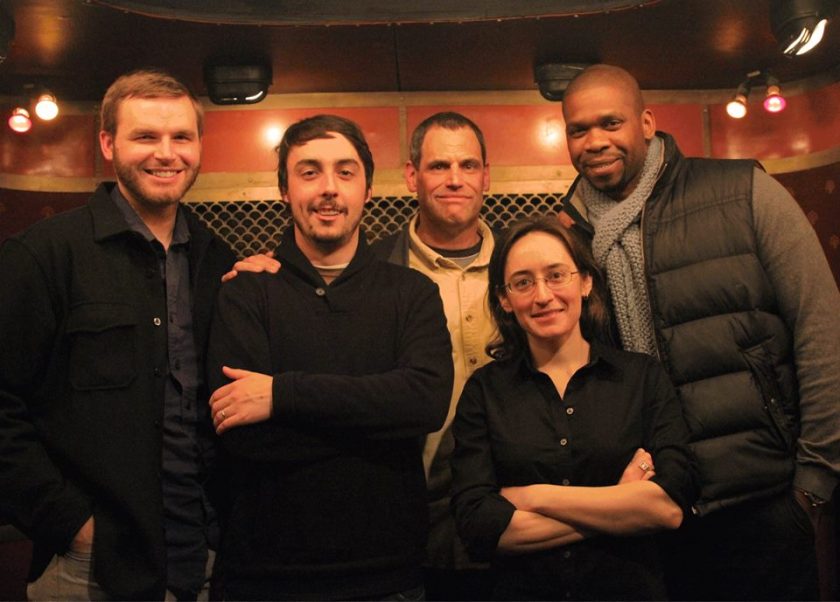 Two weeks ago I was invited to read fiction on stage in a Williamsburg, Brooklyn, bar called Pete’s Candy Store. Pete’s often hosts readings, but only once a year dedicates a night to veteran writing. This year’s event was hosted by Kaboom author and Words After War mainstay Matt Gallagher, who had many nice things to say about me and my fellow readers Paul Wolfe, Teresa Fazio, and Brandon Willitts. Wolfe, a former Army officer now at Columbia, read fiction set in Iraq. Fazio, a former Marine officer, read from a memoir-in-progress. Willitts, a Navy enlisted veteran, read fiction set in the American west. I read an adaptation of a myth I first encountered in Ovid’s The Metamorphoses called “Cyex and Alceone.” My adaptation, called “Cy and Ali,” holds true to the outlines of Ovid’s myth, but I placed my updated story in the modern era, with action set in Afghanistan and back home. The story wasn’t new—I first published it on my old blog 15-Month Adventure then later republished it in Time Now, but no one seemed to notice or mind. Two listeners liked the way I included a woman’s point-of-view, which was cool. Another told me that the story made her choke up a bit. That’s what you get I guess with stories based on myth: big emotions. “If you want to make your readers feel loss, make them love something and then take it away,” the writing workshop maxim goes.
Two weeks ago I was invited to read fiction on stage in a Williamsburg, Brooklyn, bar called Pete’s Candy Store. Pete’s often hosts readings, but only once a year dedicates a night to veteran writing. This year’s event was hosted by Kaboom author and Words After War mainstay Matt Gallagher, who had many nice things to say about me and my fellow readers Paul Wolfe, Teresa Fazio, and Brandon Willitts. Wolfe, a former Army officer now at Columbia, read fiction set in Iraq. Fazio, a former Marine officer, read from a memoir-in-progress. Willitts, a Navy enlisted veteran, read fiction set in the American west. I read an adaptation of a myth I first encountered in Ovid’s The Metamorphoses called “Cyex and Alceone.” My adaptation, called “Cy and Ali,” holds true to the outlines of Ovid’s myth, but I placed my updated story in the modern era, with action set in Afghanistan and back home. The story wasn’t new—I first published it on my old blog 15-Month Adventure then later republished it in Time Now, but no one seemed to notice or mind. Two listeners liked the way I included a woman’s point-of-view, which was cool. Another told me that the story made her choke up a bit. That’s what you get I guess with stories based on myth: big emotions. “If you want to make your readers feel loss, make them love something and then take it away,” the writing workshop maxim goes.

I’m working on a series of stories based on Ovid. The war lit scene has done ancient Greece to death—Sparta, Odysseus, Penelope, Antigone, etc.—so my schtick is to do classical Rome. The physical transformations of Ovid’s The Metamorphoses, when updated in the vernacular of fiction, give your stories a magical realist bent, with people changing into trees and birds and such things, which really wrenches your stories out of the mode of journalistic rendering of realistic detail in a hurry, if that’s what you want. I’ll let you know how it works out.
The expanding and permeable borders of the veterans writing scene continue to admit new members and permute in interesting ways. In the audience at Pete’s were two Army friends, Sean Case and Erin Hadlock. Both veterans, each has contributed significantly to veterans writing. Sean, who keeps an eye on the latest-and-greatest in Arabic literature, was the first to alert me to Hassan Blasim—until someone tells me otherwise, Case was the man who “broke” Blasim in America, no small achievement. Hadlock recently published an essay co-written with Sue Doe in Generation Vet: Composition, Student-Veterans, and the Post-9/11 University (2014) called “Not Just ‘Yes Sir,’ ‘No Sir’: How Genre and Agency Interact in Student-Veteran Writing” that was referred to left-and-right in panels at the recent Conference on College Composition and Communication. Apparently, “military literacy genres”—think awards, evaluations, mission orders, field manuals, storyboards, etc.—are red-hot subjects of study in academia. But Hadlock’s bigger claim to fame is that she was Matt Gallagher’s first squad leader in ROTC way back when at Wake Forest. Now that’s saying something….

Thanks to Jillian Capewell and Lindsay Hood, the organizers of Pete’s Candy Store Reading Series.
